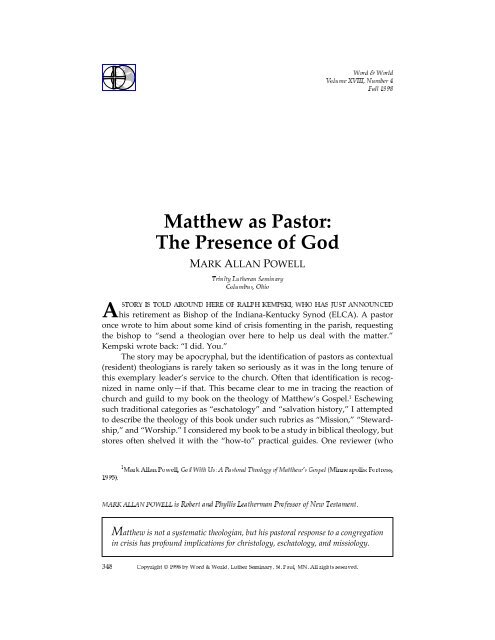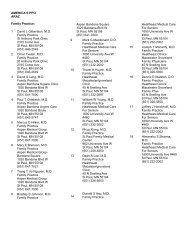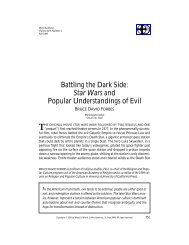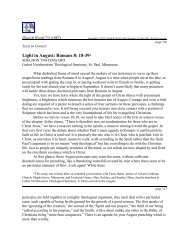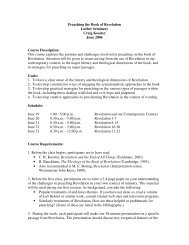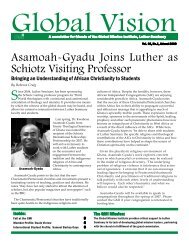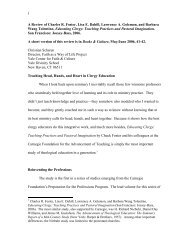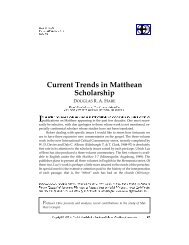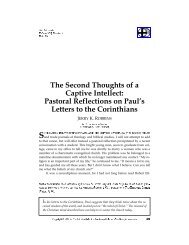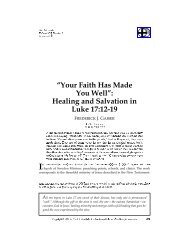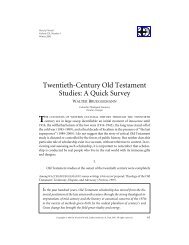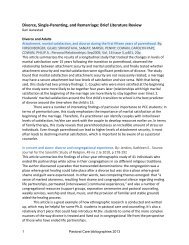Download Article PDF - Word & World - Luther Seminary
Download Article PDF - Word & World - Luther Seminary
Download Article PDF - Word & World - Luther Seminary
You also want an ePaper? Increase the reach of your titles
YUMPU automatically turns print PDFs into web optimized ePapers that Google loves.
<strong>Word</strong> & <strong>World</strong><br />
Volume XVIII, Number 4<br />
Fall 1998<br />
Matthew as Pastor:<br />
The Presence of God<br />
MARK ALLAN POWELL<br />
Trinity <strong>Luther</strong>an <strong>Seminary</strong><br />
Columbus, Ohio<br />
ASTORY IS TOLD AROUND HERE OF RALPH KEMPSKI, WHO HAS JUST ANNOUNCED<br />
his retirement as Bishop of the Indiana-Kentucky Synod (ELCA). A pastor<br />
once wrote to him about some kind of crisis fomenting in the parish, requesting<br />
the bishop to “send a theologian over here to help us deal with the matter.”<br />
Kempski wrote back: “I did. You.”<br />
The story may be apocryphal, but the identification of pastors as contextual<br />
(resident) theologians is rarely taken so seriously as it was in the long tenure of<br />
this exemplary leader’s service to the church. Often that identification is recognized<br />
in name only—if that. This became clear to me in tracing the reaction of<br />
church and guild to my book on the theology of Matthew’s Gospel. 1 Eschewing<br />
such traditional categories as “eschatology” and “salvation history,” I attempted<br />
to describe the theology of this book under such rubrics as “Mission,” “Stewardship,”<br />
and “Worship.” I considered my book to be a study in biblical theology, but<br />
stores often shelved it with the “how-to” practical guides. One reviewer (who<br />
1 Mark Allan Powell, God With Us: A Pastoral Theology of Matthew’s Gospel (Minneapolis: Fortress,<br />
1995).<br />
MARK ALLAN POWELL is Robert and Phyllis Leatherman Professor of New Testament.<br />
Matthew is not a systematic theologian, but his pastoral response to a congregation<br />
in crisis has profound implications for christology, eschatology, and missiology.<br />
348 Copyright © 1998 by <strong>Word</strong> & <strong>World</strong>, <strong>Luther</strong> <strong>Seminary</strong>, St. Paul, MN. All rights reserved.
Matthew as Pastor: The Presence of God<br />
liked the book) wrote, “Powell regards the first evangelist as a pastor instead of as<br />
a theologian.” No. Not instead of.<br />
My thesis is that Matthew’s theology developed within the crucible of firstcentury<br />
pastoral ministry and that it can be understood best when it is articulated<br />
in terms relevant to such a context. It was at this level that Matthew’s theology was<br />
most self-aware. I suspect that this evangelist would have felt more comfortable<br />
describing his strategy for evangelism than his doctrine of the atonement. I suspect<br />
that, on a day-to-day basis, he could have gotten more invested in planning a<br />
liturgy than developing a christology. Yet in either of these instances, the former<br />
activity may include or imply the latter. Of course Matthew had views about what<br />
we would call eschatology and salvation history, but these categories (as such)<br />
represent foreign impositions on his conceptual framework. He thought in terms<br />
of mission, worship, and discipleship; his theology was pastoral, more practical<br />
than theoretical.<br />
I will now illustrate this vision of Matthew as pastor by tracing a single<br />
theme in the First Gospel.<br />
I. WHERE IS GOD<br />
The presence of God is a matter of pastoral concern for every age. Where is<br />
God Biblically, this question occurs frequently on the lips of the heathen (Pss<br />
79:10; 115:2; Joel 2:17), but is also expected to be found on the lips of the faithful<br />
(Jer 2:6, 8). Where is God In heaven, of course (see Ps 115:3; Matt 5:34; 23:22), but<br />
there is more to it than that. Where do we find God in our world today Think for a<br />
moment of how members of a Christian congregation might answer that question:<br />
In the beauty of nature. In the laughter of children. In the kindness of strangers.<br />
These are not answers Matthew would give.<br />
Matthew’s Gospel was written in a time and place when the question of<br />
God’s presence was especially poignant. Matthew and his readers apparently believed<br />
that the world in general and Israel in particular had fallen upon hard<br />
times. Indeed, N. T. Wright has recently argued that most Jews in the first century<br />
believed that they were still in exile, that God had never returned to dwell in the<br />
reconstructed temple. 2 While such passages as Matt 23:21 seem to call the latter assertion<br />
into question, the temple had at any rate been destroyed by the time Matthew<br />
was written and the promised land overrun by pagan soldiers. So there was<br />
paradox: earth may be the footstool of God (5:35), but all the kingdoms of earth<br />
were ruled by Satan (4:8-9). The temple may once have been God’s dwelling place,<br />
but it had become first a den of robbers (21:13) and then a pile of rubble. All Jews<br />
had to ask, “Where is God” and Christian Jews like Matthew prepared a distinctive<br />
response: The kingdom of Satan will not stand. His house is being plundered<br />
(12:29), for something greater than the temple has come (12:6).<br />
God is present in Jesus. Matthew affirms the presence of God in Jesus in a way<br />
that goes beyond anything found in his sources (the Gospel of Mark or the Q tradi-<br />
2<br />
N. T. Wright, The New Testament and the People of God (Minneapolis:Fortress, 1992), esp. 268-270.<br />
349
Powell<br />
tion). Matthew does not just want to say that God acts through Jesus. For Matthew,<br />
the abiding presence of God is tied to the very existence of Jesus. When Jesus<br />
is born into this world, Matthew believes that people can say, “God is with us”<br />
(1:23). Whatever this means, it seems at least to indicate that God’s presence is<br />
manifested in the person of Jesus in a way that is unprecedented: God is now present<br />
in a way that God has not been before.<br />
Just how far Matthew is willing to take this becomes evident from the fact<br />
that Jesus is repeatedly presented as an object of worship in this gospel. On eight<br />
different occasions, Matthew uses the word proskunevw to describe people worshiping<br />
Jesus, always in contexts that meet with approval (2:11; 8:2; 9:18; 14:33;<br />
15:25; 20:20; 21:16; 28:9, 17); by contrast, God is worshiped only three times: (9:8;<br />
11:25; 15:31). The word proskunevw is used with reference to Jesus only once in<br />
Mark (5:6—where it may just refer to an act of extreme respect) and only once in<br />
Luke (24:52—which is textually uncertain). Even John’s Gospel uses proskunevw<br />
with reference to Jesus only once (9:38). Matthew does so eight times.<br />
In Matthew, the word proskunevw is not used to describe the attitude that one<br />
would show to a human being. 3 In fact, Jesus says (quoting scripture) that people<br />
should worship (proskunevw) no one except “the Lord God.” According to this declaration,<br />
not only is worship of the devil proscribed, but worship of kings, prophets,<br />
and messiahs as well. According to Matthew’s theology, Jesus may be King of<br />
the Jews, Messiah, Son of Man, or Son of God (as he was for Mark) and still not<br />
qualify to receive whatever sort of worship is indicated by the word proskunevw.<br />
But he does receive it, with Matthew’s approval, eight times. Jesus can receive<br />
such worship without violating his own rule about worshiping the Lord God only<br />
because, for Matthew, God is present in Jesus to such an extent that worshiping Jesus<br />
counts as worshiping the Lord God.<br />
This is an amazing development in the history of Christian theology. We are<br />
still many years from Nicea or Chalcedon, but already Matthew is making a pastoral<br />
decision that reveals the sort of theology that would ultimately be expressed<br />
in the doctrine of the divinity of Christ. I doubt that Matthew has much interest in<br />
the development of doctrine as such. His radically monotheistic Christian community<br />
has posed a practical, liturgical question: “Is it appropriate to worship Jesus”<br />
He decides that it is, that this does not violate monotheism, but recognizes a definitive<br />
locus of the Lord God’s presence. That pastoral decision was profoundly<br />
theological, though Matthew locates the presence of God in Jesus on a pragmatic<br />
rather than theoretical level. He treats Jesus as effectively divine without attempting<br />
to articulate the rationale for doing so. Matthew does not specifically say that<br />
“Jesus is God,” but by simultaneously affirming (1) that one should worship only<br />
the Lord God and (2) that one may worship Jesus, he comes awfully close.<br />
Jesus is present in the church. To say that God is present in Jesus does not yet<br />
answer the question of God’s presence in a way that would be satisfying for Matthew’s<br />
congregation or for anyone else who lives in an era other than that in which<br />
3<br />
The “king” in Matthew 18:26 is a parabolic image of God.<br />
350
Matthew as Pastor: The Presence of God<br />
Jesus was here on earth. We can almost hear Matthew’s congregants responding<br />
sardonically, “If only I had been around back when Jesus was here, I could have<br />
looked him up and my search for God would have been over!”<br />
Matthew believes that God is still present in Jesus, who is still here among his<br />
followers. Such an affirmation seems so obvious that we almost take it for granted,<br />
assuming that it would be standard for any Christian community. But neither<br />
Mark’s Gospel nor the Q material contains anything indicating that Jesus will still<br />
be present during the time between his physical life on earth and his return. 4 He<br />
was once here among us, and someday he will come again. That’s it. Indeed, the<br />
Gospel of Mark records Jesus as indicating—not once, but twice—that he will not<br />
be present with his followers during those intervening years: “The days will come<br />
when the bridegroom is taken away” (Mark 2:20). “You always have the poor with<br />
you...but you will not always have me” (Mark 14:7). Matthew recognizes the literal<br />
or physical absence of Jesus also and so his gospel contains versions of these<br />
two sayings (9:15; 26:11). But Matthew also adds a number of verses that indicate<br />
Jesus will continue to be present in some other sense:<br />
“whoever welcomes you, welcomes me” (10:40)<br />
“where two or three are gathered in my name, I am there among them” (18:20)<br />
“just as you did it to one of the least of these who are members of my family,<br />
you did it to me” (25:20; cf. 25:45)<br />
“I am with you always, to the end of the age” (28:20)<br />
In every case, the locus of Jesus’ promised presence is the community of followers<br />
elsewhere called “the church” (16:8; 18:17). The only instance in which this<br />
identification might be controversial is the Matthew 25 reference, which derives<br />
from the famous “sheep and goats” analogy for the final judgment. At a popular<br />
level this text is often held to portray Jesus as present among the poor and needy<br />
people of the world, but at closer examination it actually portrays him as present<br />
among the poor and needy “members of his family.” 5<br />
Locating the presence of Jesus (who manifests the presence of God) in the<br />
Church is, again, a bold theological move. Does Matthew mean to establish a certain<br />
monopoly for the church as mediator of God’s presence on earth Would Matthew<br />
mean to say that God is not found elsewhere—in the Roman temples or the<br />
Jewish synagogues Ultimately, Matthew knows that God is “Lord of heaven and<br />
earth” (11:25a), and there are few statements in this gospel that would explicitly<br />
limit God’s arena of revelation (though 11:25b is one of them). But Matthew does<br />
seem to envision a certain “funnel effect” as to where God is most likely to be<br />
4<br />
An important verse that points in this direction is Mark 9:37, though Markan scholars would generally<br />
concede that this evangelist would not have not intended these words to be read as promising an<br />
actualization or embodiment of Jesus’ continuing presence in the church. The seed is there, however, and<br />
development can be seen in Matt 10:40 and 18:5.<br />
5<br />
Most Matthew scholars take the story in 25:31-46 as promising judgment on non-Christians (“the<br />
nations”) for how they treat Christian missionaries (compare 10:40-42). For a contrary, though in my<br />
view unconvincing argument, see Ulrich Luz, “The Final Judgment (Matthew 25:31-46): An Exercise in<br />
‘History of Influence’ Exegesis,” in Treasures New and Old: Recent Contributions to Matthean Studies, ed.<br />
David R. Bauer and Mark Allan Powell (Atlanta: Scholars, 1996) 271-310.<br />
351
Powell<br />
found: God’s presence is most clearly manifest in Jesus, who promises to be present<br />
among his followers in the church. Similarly, <strong>Luther</strong> said that though God is<br />
everywhere, God has only promised to meet us where the word is rightly<br />
preached and the sacraments rightly administered.<br />
If Matthew’s first proposition implied a christology, this second one implies<br />
an ecclesiology. I do not see Matthew making any moves to develop a doctrine of<br />
the church as such, but his pastoral response to the question of God’s promise<br />
leads him to a conclusion that has significant ramifications for such a doctrine<br />
when it is developed. Indeed, we might take his proposition as an early attempt to<br />
define the church. For Matthew, the church is fundamentally “those people with<br />
whom God through Jesus has promised to dwell.” Specifically, the promises of<br />
Christ’s presence indicate a definition of church that would be fundamentally<br />
practical rather than creedal. Jesus will be present with those people who gather<br />
for prayer in his name (18:20) and who go out as missionaries to proclaim the gospel<br />
of the kingdom (10:40; 25:20). He will be present with those who baptize in the<br />
name of the Father, Son, and Holy Spirit, and who teach people to obey his commandments<br />
(28:16-20). He will be present in the church, and in all these instances<br />
those people who may be identified as “church” are identified by their activities<br />
rather than (fundamentally) by their beliefs. 6<br />
The church is present in the world. What we have proposed thus far may indicate<br />
that Matthew would respond to those who are looking for God in this world<br />
by telling them to go to the church: if they find the church, they will find Jesus, and<br />
when they find Jesus, they will find God. Well, yes, but that’s not how Matthew<br />
thinks it will happen. The parable of the lost sheep (18:10-14), the great commission<br />
(28:16-20), and numerous other texts all indicate that it is God, Jesus, and the<br />
church that do the finding. To the person who worries over where God is to be<br />
found in this world, Matthew the pastor might counsel “Seek and you will find”<br />
(7:8; cf. 6:33; 13:44-45). Or, he might just say, “Don’t worry. God, through Jesus,<br />
through the church, is coming to find you!”<br />
For Matthew it is absolutely essential for the church to be fully present in the<br />
world, not divorced from it as some sort of countercultural alternative community<br />
that people can join if they desire. In this sense, the most important word in the<br />
great commission is the first: “Go!” Matthew does not present the church as a<br />
static institution that is willing to baptize people of all nations who happen to<br />
come knocking on its doors. Rather, the church is a dynamic movement of people<br />
preaching the gospel of the kingdom throughout the world (24:14), aggressively<br />
making disciples of all nations (28:18). Of the texts listed above locating Jesus’ presence<br />
in the church, all but 18:20 depict that church as engaged in evangelistic ministry<br />
in the world (25:35 and 25:40 depict those who suffer hardships on account of<br />
their ministry to “the nations”).<br />
Another important text in this regard is 16:18, in which Jesus has been said to<br />
offer a veritable “charter” for the church. Of the many things that he might have<br />
6<br />
Certain beliefs (even creedal ones) are of course assumed. People who fulfill the commission in<br />
28:16-20 must have some notion of what it means to call God “Father, Son, and Holy Spirit.”<br />
352
Matthew as Pastor: The Presence of God<br />
said about the church that he would build, the one thing that Jesus does say is,<br />
“The gates of Hades will not prevail against it.” Some have taken this as implying<br />
a promise of protection: if the gates of Hades attack the church, they will not win.<br />
This demands an unlikely image, since gates do not usually attack anything. Normally,<br />
they get attacked. The image for Matthew is one of the church storming the<br />
gates of Hades, which must give way before it. The church is on the offensive and<br />
will overcome the power of death and the devil in this world. This image is parallel<br />
to that of Jesus and his followers plundering the devil’s house now that this<br />
“strong one” has been bound by God (12:28-29). 7<br />
Reading Matt 16:18 as a promise of protection is unfortunate because protection<br />
is the one thing that Jesus does not promise the church in Matthew, except in<br />
an ultimate, eschatological sense (10:26-31). Jesus’ followers will be handed over to<br />
councils, beaten in synagogues, and dragged before governors and kings (10:17-<br />
18). They will be tortured and put to death (24:9). They will be betrayed by loved<br />
ones and hated by all (10:21-22; 24:9). Protection Jesus sends them out as sheep in<br />
the midst of wolves (10:16), and quite a few should expect to be devoured. They<br />
will drink his cup, share his baptism (20:23), and in some instances suffer even<br />
worse indignities than he did (10:25).<br />
Still the church goes out into the world and, for Matthew, becomes its salt<br />
and its light (5:13-14). For Matthew the mission of the church is to embody the<br />
presence of God as manifested through Jesus in a hostile world. This it does by<br />
good works (5:16) and by proclamation of the gospel (24:14).<br />
If Matthew’s first two propositions implied a christology and an ecclesiology,<br />
we see now a theological assessment of the relationship between church and<br />
culture. As I understand it, Matthew’s view on this subject would best be systematized<br />
as a model absent from Niebuhr’s classic study. 8 Matthew operates with<br />
what I would call a “Christ beneath Culture” paradigm, which (as the name implies)<br />
is essentially the model that Niebuhr calls “Christ above Culture” stood on<br />
its head. Matthew is optimistic about the church’s influence in the world, but this<br />
influence does not derive from the church’s acquisition of power within society<br />
but from its repudiation of such power. The church becomes the world’s salt and<br />
light precisely by remaining powerless.<br />
Again, Matthew does not develop this concept for its own sake or reflect<br />
upon it self-consciously. He does not view it at all as a concept to be developed;<br />
rather, he attempts to interpret the experience of the church in a manner consistent<br />
with what he believes about God’s revelation in the world. As a pastor engaged in<br />
responding to the critical and practical concerns of everyday people, Matthew is<br />
“doing theology.” With little interest in the development of dogma or any theoretical<br />
formulation, Matthew nevertheless initiates and advances theological<br />
propositions.<br />
7<br />
A different view is put forward by Joel Marcus, “The Gates of Hades and the Keys of the Kingdom<br />
(Matt 16:18-19),” Catholic Biblical Quarterly 50 (1988) 443-455. Marcus takes “gates” as a metaphor for<br />
demonic agents.<br />
8<br />
H. Richard Niebuhr, Christ and Culture (New York: Harper, 1951).<br />
353
Powell<br />
II. MATTHEW’S PASTORAL THEOLOGY<br />
The advent of redaction criticism in the latter half of the twentieth century<br />
brought a new awareness of the need to view Matthew and the other evangelists<br />
as creative theologians. It has become commonplace for books on the gospels to<br />
stress the theology of Matthew or of whichever other book is under inspection.<br />
Quite naturally, these studies usually borrow their categories for organizing the<br />
evangelists’ thoughts from the field of dogmatic or systematic theology. There is<br />
nothing necessarily wrong with doing this, but we should recognize the anachronism.<br />
Matthew probably did not think of himself as “a theologian” in the sense that<br />
scholars often use that term today. Compare Matt 28:19-20 with 2 Tim 4:2-5. Incredibly,<br />
Matthew seems to think people become Christians by being taught to behave<br />
in a certain way, as opposed to being taught to believe certain ideas! For<br />
Matthew, even false teachers are definitively those whose actions are out of line<br />
with God’s will—teachers are false not because the content of their teaching is<br />
false, but because they do not live the way they ought to live (7:15-23; 23:2-3). Still,<br />
as a pastor, Matthew is fundamentally concerned with the quality and integrity of<br />
people’s lives—both within his community of faith and outside of it. In addressing<br />
such concerns, he earns his designation as a theologian. He has no “ivory tower,”<br />
but he is no less profound a thinker for its absence.<br />
We have examined but one instance in which Matthew’s pastoral theology<br />
may be seen to work. In responding to the question, “Where is God to be found in<br />
this world” Matthew inevitably wrestles with what we would call christological<br />
and ecclesiological arguments, and struggles as well with the question of how<br />
matters of faith affect life in the world at large. The practical problem is how God<br />
can be present in a world ruled by Satan. The ultimate answer is that God is present<br />
through powerless ones whose continual repudiation of worldly power undermines<br />
the kingdom of Satan and portends its eventual collapse. The necessary link<br />
to affirming that the Lord of heaven and earth is now manifest in such a powerless,<br />
oppressed minority is found in the person and work of Jesus. The community<br />
of the powerless—the church—is a continuation of Jesus’ embodiment of God’s<br />
presence on earth. To people who are asking where God is to be found, Matthew<br />
points to the powerless Christians going out into the world as sheep in the midst<br />
of wolves. Welcome them and the message they bring, and you will welcome the<br />
one through whom God is with us; indeed, you will welcome the very God who<br />
sent him (10:40).<br />
354


